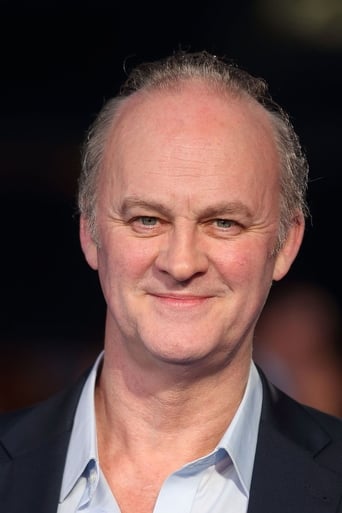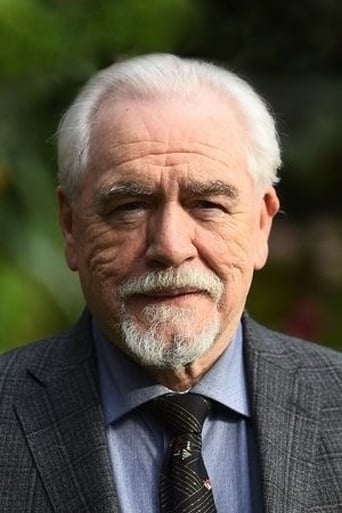Redwarmin
This movie is the proof that the world is becoming a sick and dumb place
BlazeLime
Strong and Moving!
Plustown
A lot of perfectly good film show their cards early, establish a unique premise and let the audience explore a topic at a leisurely pace, without much in terms of surprise. this film is not one of those films.
Yash Wade
Close shines in drama with strong language, adult themes.
Dr Jacques COULARDEAU
How can a writer decide to kill his character when this character is particularly famous and well known and admired and considered as a real man? He sure can and Sir Arthur Conan Doyle did it without any regret and against all kinds of resistance from everywhere. But that starts in him a phenomenal storm under his skull, a fit of total schizophrenia. He relives his own life and he searches his youth and grown up life to try to understand why he killed his own doppelganger without whom he is nothing but the very shadow of himself, not even a shade cast by a dead tree, just a ghost accompanying his consumptive wife to the grave. That's what this film tells us and the life of Sir Conan Doyle is the centre of the film. The alcoholic father and in those days you ended up in an asylum, locked up behind bars and even with chains and a straight jacket if necessary. His frustrated mother who is paranoid about the end of this man she had institutionalized. The obsession of the young Conan Doyle with his professor, an obsession that was so true, so strong that he had to cannibalize him into his own fictional creation of a character. That's the kind of passion some students have the chance to meet in their studying years: the passionate attraction to a professor who will have the passionate answer of literally enchaining him with his own liberty so that the student will never be able to go away, to go another way because it would mean he is losing his freedom. That's how some students who have some difficulties in their life, family, money, ambition, wavering stamina, difficulty at defining their own future goal and route and following their own trail find the way up and out onto the road that is generally less traveled as the poet put it. Most students never encounter that ethereal passion and most professors never even imagine it can exist. They have vaguely heard of Conan Doyle and Doctor Joseph Bell. Or H.G. Wells and Professor Thomas Henry Huxley. They have also seen, witnessed and at times assisted such a passion but everyone, and first of all the professor and the student, remained quiet about it. They did not speak bout it. They respected it because a passion has to be respected and some of our best minds in this world have been produced by such scholastic passions. That's the fundamental system of English and also American universities: the personal relations between the professors and the students are considered as the most formative part of the teaching and training. At times it does not work at all because the student wavers and steps back, or because the professor is too hard and frightens the student away. It is not a question of gender at all, and in all the meanings of the term or of the term it takes the place of in our politically correct society. Here Conan Doyle after a very successful debut decides to cut off the umbilical cord. But will he succeed? Dr Jacques COULARDEAU, University Paris 1 Pantheon Sorbonne, University Paris 8 Saint Denis, University Paris 12 Créteil, CEGID
Robert J. Maxwell
This is a fantasy, a mosaic made out of three complementary sets of tesserae. We have the "biographer" Selden (Tim McInnerny) whose assignment is to try to dig up any links between Sir Arthur Conan-Doyle (Douglas Henshall) and his fictional creation, the detective Sherlock Holmes, although it is agreed that any results will not be published. There are also contemporary episodes from which Selden is excluded, for good reason. These include a couple of women -- Doyle's own devoted wife and a knockout babe he would like to disarticulate with his tongue. And then there are flashbacks to Conan-Doyle's own earlier years, including his medical tutelage at Edinburgh under Doctor Joseph Bell (Bryan Cox). The three sets of episodes are woven together in a way that is sometimes confusing, the way a dream is confusing, but gradually revealing, until, by the end, all is explained.Or almost all. I didn't get the recurring images of the severed ears crawling with maggots. Okay -- "The Cardboard Box." But why is this image repeated? Why is it IN there in the first place? I missed the first few minutes and perhaps the answer lies there, though I can't imagine how. Of course I could speculate, but it is always dangerous to theorize before one is in possession of all the relevant facts.The most interesting moments -- not necessarily the most dramatic -- are when Dr. Bell pulls of one of those stunts that were later to become inferential staples of the Holmes character. Given a watch to examine, a watch that has been owned by a perfect stranger, Bell complains that the watch has recently been cleaned and this robs him of his most important clues to the owner's character, so he can only say that the man was careless, came from a good family but found his fortunes drop, punctuated by intervals of prosperity, that in later life his habits declined, probably because of drink, and that he had a penchant for 17-year-old blonds all his life. (I made that last one up.) Conan-Doyle must have represented one of the last twitches of the Scottish enlightenment that enthroned reason and empiricism, because when he was old, after he'd lost a son in the war, Conan-Doyle turned to mysticism and the séances that were fashionable at the time.The mystery that is investigated in some detail is the reason why Conan-Doyle decided to "kill" his creation, Sherlock Holmes, at a time when Holmes was probably the most famous fictional character in the world, much as Brittany Spears is now. I failed to catch any big reveal towards the end, but at the climax Conan-Doyle resurrects his detective and they march off together into the sunlight. If the viewer is left still a little mystified, evidently Conan-Doyle wasn't, and that's what counts. However, the detective figure that is Holmes in the last few shots on the Great Grimpen Mire is not by any definition Sherlock. It is MYCROFT Holmes that we see. Who's kidding whom around here? It's an inexpensive production from the BBC and it's about an interesting guy, Conan-Doyle. He was at his peak during the Jack-the-Ripper murders in 1875. Too bad he didn't tackle Saucy Jack. Of course Conan-Doyle can't be counted among the world's most graceful prose artists. On a dark and stormy night, "the wind sobbed like a child in the chimney." (How did the child get into the chimney?) And, true, our introduction to Holmes, in "A Study in Scarlet", makes him look an awful lot like Poe's August Dupin in "The Murders in the Rue Morgue." But what does that matter? Conan-Doyle ground out these entertaining mysteries with sprezzatura, hiding his art by making it look so easy, and he gave us some deathless lines. "The curious incident of the dog in the night." "She was always THE woman." And, "Quick, Watson, the needle." (Well, he never said exactly that, but, again, so what?) You may have to be in the right mood to watch this. It's rather slow. But it's a must-see for the Irregulars.
leno
The first 50 minutes of this movie were quite boring. It focused on the personal problems Doyle had, including his sick wife, death threats by fans, a pushy publisher and feelings of guilt concerning his mentally ill father. Even though these subjects had an important impact on Doyle's life, I was more curious about the birth of Sherlock Holmes. The last 40 minutes were excellent. We finally got a look inside Doyle head, how he created Holmes and why he had to 'kill' Holmes. The actors are excellent. Including the intriguing Selden played by Tim McInnerny, Arthur Conan Doyle, a compelling role played by Douglas Henshall and Brian Cox as the 'role model' for Sherlock Holmes, Dr. Bell. The locations are good, especially for a TV movie and the camera work is nice. If the first 50 minutes were as good the the last 40 minutes this would have been a small masterpiece.
Shawn Watson
Plus I'm not entirely sure if this is based on truth or if it's all just a complete fantasy. The idea of Doyle's life being picked apart by an apparition of the very character he created but it's a bit far-fetched to be believable. Still, it's interesting at the very least.However, very sad people like me will notice many anachronisms. Such as The Hound of the Baskervilles being hailed as Holmes' return from the grave even though it is set before his encounter with Moriarty at the Reichenbach Falls. I did find it weird that Brian Cox plays Doyle's mentor Doctor Joseph Bell while his son Alan Cox played Watson in Young Sherlock Holmes.Some nice locations and warm photography are about all this TV movie has to offer in terms of atmosphere. It's sparsely populated and some things are never quite clear. Like what was that gunshot when Kingsley briefly disappeared in the woods? Did that manifest in the cupboard actually exist? How did an apparition of Holmes, that only Doyle could see, end up questioning his mother? The score is also minimal, but could have been taken a bit further without being intrusive.For Holmes/Doyle fans and the merely curious alike.




